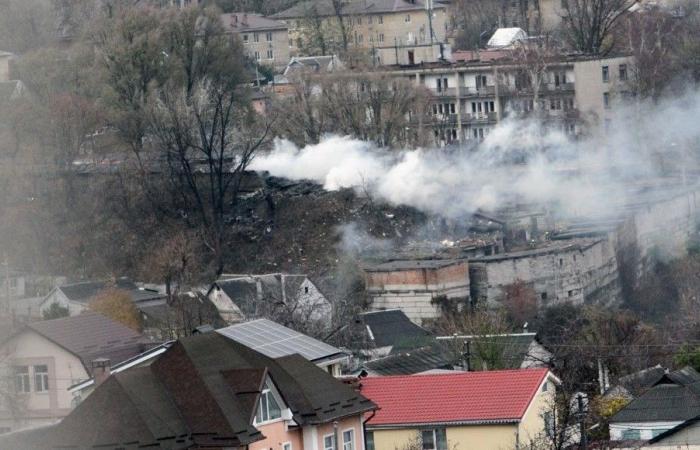Tension rose a notch between Westerners and Russia after the firing of a new strategic missile Russian in Ukraine on Thursday. Vladimir Putin has again considered using nuclear weapons after Ukraine used long-range American missiles to strike Russian territory. While the war has just passed the symbolic threshold of 1,000 days and the imminent arrival of Donald Trump at the White House worries the Ukrainians and his supporters, should we be worried about this renewed tension?
New Russian missile raises tension
Russia decided to launch a new type of missile on Thursday. Called Orechnik (hazel), it is a medium-range ballistic missile, capable of hitting targets between 3,000 to 5,500 km. The weapon can reach a hypersonic speed of Mach 10 (approximately 12,350 km/h), making its interception by current air defense systems extremely difficult, if not impossible. The missile can also carry several nuclear warheads as well as maneuvering charges, further complicating its interception.
Although the shot, which targeted Dnipro (in eastern Ukraine), did not carry a nuclear charge, the Orechnik's potential raises concerns. The existence of this missile, unknown until its use, highlights the arms race taking place behind the scenes of the Russian-Ukrainian conflict, particularly since the withdrawal of the United States from the INF Treaty in 2019, which regulates the use of intermediate-range nuclear weapons.
According to Vladimir Putin, this Russian shot was fired in retaliation for the decision by the United States and the United Kingdom to authorize Ukraine to use long range missiles on Russian soil.
Reprisals and show of force
The firing of this new missile is part of a logic of reprisals and a show of force. Vladimir Putin justified this action as a response to “aggressive actions of NATO countries“. This shot aims to dissuade the West from providing increased military aid to Ukraine and to affirm Russia's ability to respond to what it perceives as an existential threat. Vladimir Putin was explicit in his address to the Russian nation on Thursday: “We consider that we have the right to use our weapons to target the military installations of countries that allow their weapons to be used against our installations.“.
The recent escalation began with the arrival of North Korean troops on Russian soil. 10 to 12,000 men must be engaged in combat against the Ukrainian army. This unprecedented military support from Pyongyang upsets the balance of forces and prompted the West to authorize Ukraine to use long-range weapons on Russian territory. Moscow responded by firing the Oreshnik, taking the confrontation to a new level.
The fear of a nuclear slippage: a calculated risk?
Despite heightened tensions, some elements suggest that the situation remains under control. Russians and Americans respected escalation management codes. Washington was informed in advance of the missile launchand the two powers have so far avoided overreacting to provocations. This mutual caution, dictated by awareness of the nuclear risk, allows us to hope that escalation will remain limited.
Currently, the use of nuclear weapons, although feared, is considered unlikely by experts. The cost of such action, both on a human and geopolitical level, would be exorbitant for Russia. However, Moscow's nuclear rhetoric and Putin's assertion that the conflict has taken a “global character” arouse concern. Cyrille Bret, associate researcher at the Jacques-Delors Institute, called for these statements not to be minimized and to “deciphering the complex but explicit grammar of Russian nuclear deterrence“.
The shadow of Trump and the quest for new balances
The upcoming arrival of Donald Trump at the White House adds a layer of uncertainty to the conflict. His desire to end the war in Ukraine risks leading to a significant reduction in American support for kyiv, encouraging the belligerents to adopt a form of wait-and-see attitude. It is therefore not impossible that the current escalation serves as preparation for this new geopolitical situation.
Faced with the threat of Russian missiles, Ukraine has called on its allies to provide it with more efficient anti-aircraft defense systems capable of intercepting hypersonic missiles. President Volodymyr Zelensky insisted on the urgency of acquiring “systems that can protect lives in the face of new risks“.
.






